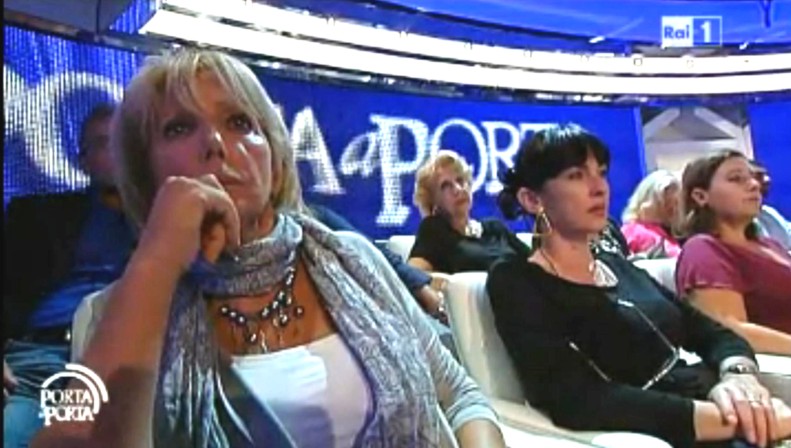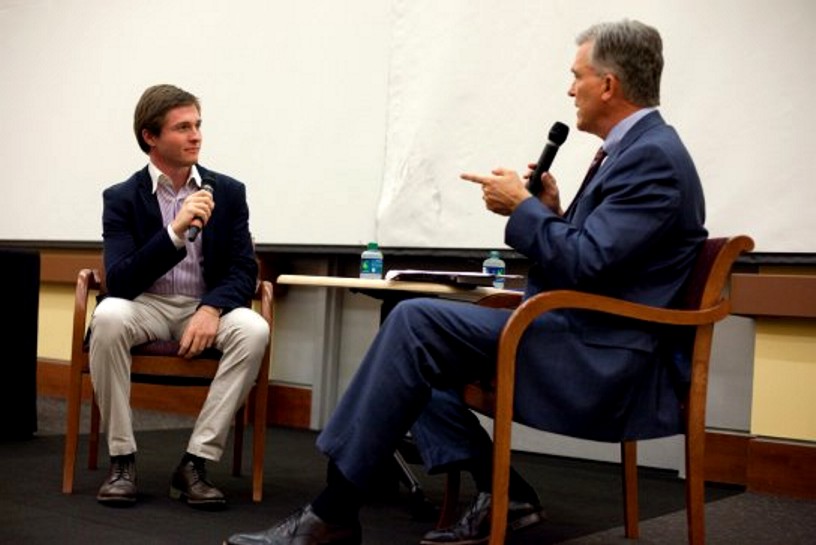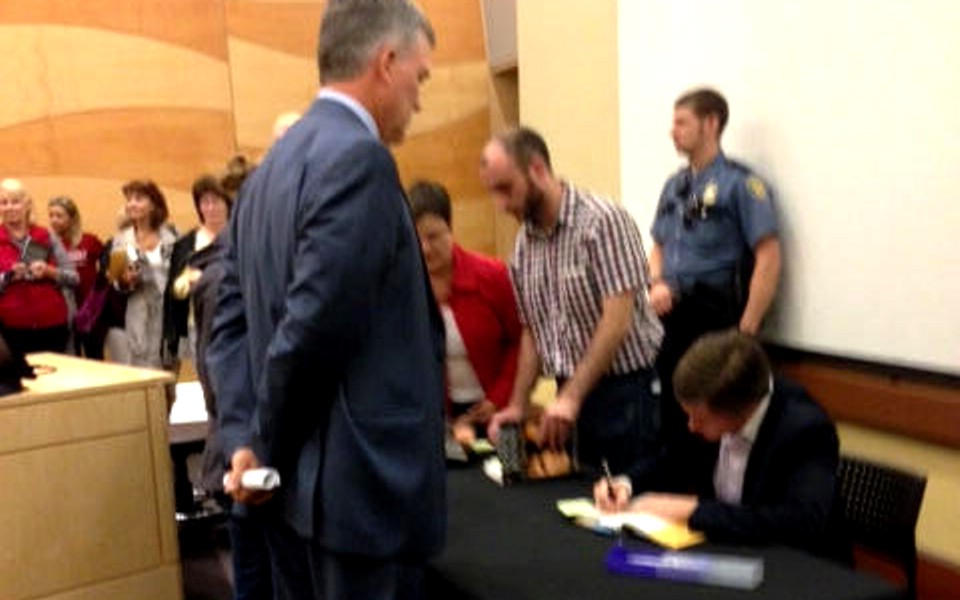
Category: Hoaxers from 2007
Saturday, January 12, 2013
How Much To Place Blame On Guede? IMMENSE Headache For RS & AK Teams
Posted by Cardiol MD
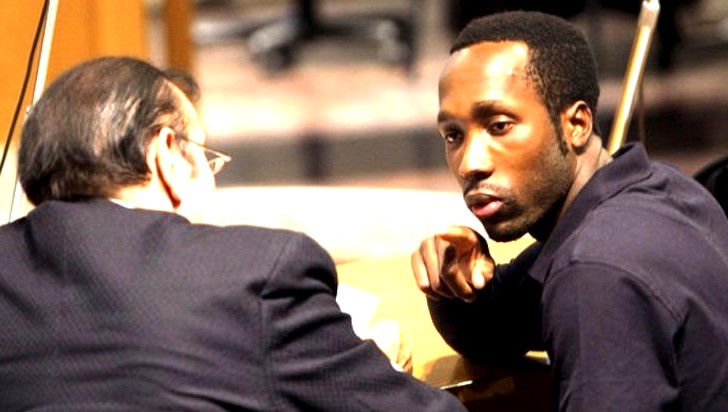
[Photo by Andrea Vogt as in December 2010 Supreme Court decides that Rudy Guede didnt act alone]
Zero To 100% Guede Was Claimed Sole Attacker
On a scale of 0% to 100% how much of the blame for the crime against Meredith has been heaped on Rudy Guede?
Well, it certainly varies. In trial court and first-appeal court it was never ever 100%.
Seemingly very scared of the harm Guede could do to their clients, if they provoked him into telling all, defense lawyers have acted consistently since 2008 and more-so since December 2010 as if they walk on eggshells around him.
In fact among the defendants and their teams only ONCE was Guede ever blamed 100%.
Sollecito’s bizarrely-titled Honor Bound 2012 book, the factually unchecked one, which now is causing him and his defense team so much trouble, was the first instance ever among those accused to try to blame Guede for the crime 100%.
Our next post will look at the categoric claims against Guede by whoever wrote that book. Meanwhile, here and now, let’s start at the beginning.
Commencing from when they were arrested, Amanda Knox pointed decisively at a black man, but of course she pointed at the wrong one: Patrick Lumumba. Make that 0% . Not long after they were arrested, Knox and Sollecito were strongly questioning the role of one another. So 100% against each other, but still a zero against Mr Guede.
In his messages from Germany Guede blamed two hasty intruders though he had no choice but to say he was there. Perhaps 33% at this point. After Guede was captured, Sollecito implied that they were at the crime scene together because he was worried that Guede would implicate him. Make that 50%.
At Guede’s short-form trial In October 2008, Judge Micheli blamed Guede 33% too. In sending Knox and Sollecito to full trial he dismissed the lone wolf theory (never really to be revived in court again) and he tentatively believed the evidence pointed to their being equally guilty.
In fact Judge Micheli tentatively blamed Knox for instigating both the attack on Meredith and the rearrangement of the crime scene. In effect he allocated 50% of the blame to Amanda Knox and 25% each to Guede and Sollecito.
Throughout trial in 2009 the Knox and Sollecito defense teams seemed to take great care not ever to blame Guede 100%, perhaps because (for murky reasons not made public) Rudy Guede had refused to testify against their clients.
Judge Massei assigned Guede 33% of the blame as he concluded that Guede had initiated the attack but that Knox and Sollecito had wielded the knives and that one of them had struck the final blow.
During trial and thereafter, the defense lawyers for the three were often on Italian TV and as our main poster the Italian lawyer Cesare Beccaria exhaustively charted in a four-part series, each “gently” blamed the other two.
We can assume that is either 33% or 50% but never more than that.
On February 24. 2011, in the Supreme Court report, on its rejection of Guede’s final appeal of his sentence for involvement in killing Meredith, blamed Rudy Guede and two others equally. Some 33% of the blame each.
The Supreme Court relied upon three facts: the physical evidence of Guede’s presence at the flat, Guede’s actual admission of his presence, and Guede’s implicit admission of shared-guilt in his documented Skype InstaMessage to Giacomo Benedetti on Nov. 19, 2007 (“I was scared that they would say I was the only guilty person”).
In a nutshell, the situation at the start of the Sollecito and Knox appeal before Judges Hellmann and Zanetti in 2011 was this:
- The Supreme Court had decided that Rudy Guede acting ALONE could not have attacked Meredith with several knives over an estimated 15 minutes, left so little physical evidence upon her, staged the break-in via the absurd route of Filomena’s window while leaving zero DNA in her room, placed Sollecito’s DNA on Meredith’s bra clasp, engineered several traces of Knox’s and Sollecito’s footprints outside the room, and placed the mixed DNA of Meredith and Knox in several different locations outside Meredith’s locked door.
- But there remains zero evidence that perps two and three which the physical evidence strongly pointed to were anyone other than Knox and Sollecito. There’s really not one speck of hard evidence to the contrary. Defenses somewhat desperately tried to engineer some at first appeal from the seemingly perjured testimony of jailbirds Alessi and Aviello and some smoke-blowing over the DNA testing, but in terms of HARD evidence came up empty-handed. Alessi did a meltdown on the stand, while Aviello turned completely cuckoo, and Judges Hellmann and Zanetti had to invent arguments frantically to dig Knox and Sollecito out of that hole.
I have done a series of posts (to be read from the bottom upward) on the Hellmann-Zanetti outcome covering many other aspects of their strange arguments.
Back in late 2010 some of us at TJMK were impressed at the alacrity with which Judge Hellman selected Conti and Vecchiotti.
We were thinking that “he had already thought it all out” [we seem to have got that-much right], and that he was “being prudently responsive to the legal and political pressures bearing down on him, and knows the ruling also calls the defendants’ bluff.”
I had posted that the defenses of Knox and Sollecito seemed to be trying to exclude evidence that they themselves tried to destroy, essentially on the grounds that their destructive attempts failed to destroy all of it, and left behind only some of it. Their argument had boiled down to whether the disputed DNA evidence is more unfairly prejudicial than probative.
It was my opinion that because it was the defendants’ deliberate conduct that nearly succeeded in extinguishing all their DNA, any US and UK courts would admit this highly relevant evidence, and let the participants duke out its fairness, in open court, in front of a jury.
I had thought that was what the Massei Court had already done, and was what the Hellmann/Zanetti court was then doing. The Hellmann/Zanetti court was doing that - but that was not all it was doing, as we now know and regret.
I had believed that the defendants would bitterly regret their petition for such DNA Expert-Opinion Review. We should know in March 2013 if they regret it at all, let alone “˜bitterly’. So far they may not, but Sollecito’s current venture into special-pleading journalism in his book seems likely to accelerate their journey to a bitter and regretted destiny.
We were less impressed with how Judge Zanetti started the appeal hearings.
To his eternal discredit Judge Zenetti uttered words to the effect that “the only thing that is “˜certain’ in Meredith’s case is that Meredith is dead.” Nothing else. In effect, illegally promising a whole new trial at appeal level - very much frowned on by the Supreme Court.
Unless the word “˜thing’ is a mistranslation, that is not the only thing that was already certain in Meredith’s Case; Many Things were then certain in her case.
For example, it is certain that the first-ever documented references to Meredith’s scream just before she was killed had already come both from the mouth of Amanda Knox herself, and from the hand of Amanda Knox, in the case of her contemporaneous personal hand-written notes.
Guede, himself, had certainly already made a documented reference to Meredith’s scream.
It was also certain that Guede had made documented references to his actual presence when Meredith screamed.
Some of these already-certain facts inconveniently undermined Hellmann’s and Zanetti’s already-assumed conclusions, so they then proceeded in-turn to undermine the “˜reliability’ of those facts, e.g. “˜it is not certain that the scream was Meredith’s scream; it could have been someone-else’s scream’; or even Amanda’s scream?
The Massei court had exhaustively presented the evidence from all sources in their conclusion that Knox and Sollecito were the ones who shared Guede’s guilt. But Hellmann/Zanetti then contradicted ALL the previous finders-of-fact with regard to Guede, essentially using five ploys in arguing:
- That Guede was Unreliable: “for example, in the questioning before the Prosecutor, he denies being known by the nickname of Baron, “¦.so as to result in a version completely incompatible with the reality of the facts as perceived and heard…” [Is that ever giving birth to a mouse?], and
- That the Supreme Court had “held Rudy Guede to be an Unreliable person”, and
- That “therefore, among the evidence against the two accused, the testimony given at the hearing of June 27, 2011 by Rudy Guede cannot be included because it is Unreliable, nor can the contents of the letter written by him and sent to his lawyers”, and
- That concerning Guede’s documented Skype InstaMessage to Giacomo Benedetti on Nov. 19, 2007 “”¦ the contents of the chat between Rudy Guede and his friend Giacomo Benedetti on the day of November 19, 2007, also listened to by the Police, can be considered in favour of the two accused”, because “he would not have had any reason to keep quiet about such a circumstance,”
- And that “So, in the course of that chat with his friend….. Rudy Guede does not indicate in any way Amanda Knox and Raffaele Sollecito as the perpetrators…..” and “.....he would not have had any reason to keep quiet about such a circumstance….. he being…. certainly the perpetrator….. of the crimes carried out in via della Pergola, that if Amanda Knox and Raffaele Sollecito had also participated, that he would at that moment have revealed this to his friend.”
So, summarising Hellmann and Zanetti, they have absurdly argued a contradiction:
- Because of Guedes notoriously unreliability, the public evidence in which he did accuse Knox and Sollecito cannot be considered as evidence of their guilt, but
- In spite of Guede’s notorious unreliability, because Guede did not accuse Knox and Sollecito in a private conversation this must be considered as conclusive evidence of their innocence.
We are not the audience to which Dr Galati’s appeal against Hellmann and Zanetti to the Supreme Court is directed. Most of us probably have some difficulty with its legalese, translated into English, so bear with it.
Dr Galati’s appeal against Hellmann and Zanetti refers to Guede’s documented Skype InstaMessage to Giacomo Benedetti on Nov. 19, 2007 as follows:
The Hellmann/Zanetti court, “has”¦ made “¦. completely anomalous use of the Skype call, accepting it for the time of Kercher’s death, but not for other circumstances which are also extremely relevant for judgment purposes, but which have been totally ignored.
In fact, in the call, Guede recounts having heard Meredith complaining about her missing money and of her intention of asking Ms Knox, with whom she had quarrelled, for an explanation (p. 10 of the call [transcript]), of having seen Meredith look in vain for the missing money in her drawer (p. 18), then of having seen Meredith look, still in vain, for her missing money in Amanda’s room (pp. 18-19 of the call [transcript]), and of having heard a girl enter the house, who could have been one of the roommates, thus Amanda (p. 11 of the call [transcript]), while the Ivorian found himself in the bathroom, just before hearing Meredith’s terrible scream which would have caused him [59] to exit the bathroom, about five minutes after the girl’s ingress (p 12 of the call [transcript])”... .
The Court has, in practice, without reason thrown the responsibility onto Guede for throwing the rock and clambering in (see pp 121-122 of the appealed judgment): in the same Skype call, Guede, however, repeatedly denies having seen the broken window in Romanelli’s room during the whole time in which he was in the house at Via della Pergola on that evening (pp 8, 20, 34 of the call [transcript]). Not only that: Rudy Guede also said that he was at Knox’s many times”› (pp 88 of the call [transcript]).
If the Court held the Ivorian citizen to be sincere in the tele-conversation with his friend Benedetti, then why not also believe him when he denies having broken in, or when he recounts Meredith having it out with Amanda, or when he says that he had been at the latter’s place many times”›?
Dr Galati’s appeal to the Supreme Court argues that the Hellmann/Zanetti appeal judgment, apart from being manifestly illogical, is manifestly contradictory with respect to the contents of the case file referred to (Article 606(e) Criminal Procedure Code). Here is what it says about their tortured interpretations of Rudy Guede.
And in the Skype call with Benedetti, intercepted unbeknownst to him, there emerge circumstances that confirm Guede’s court declarations. The Court takes the Skype call with his friend Benedetti into examination, valuing it “šin favour of the two accused”› both for what it does not say and also for what it does say, and this it does building from one, not only unexplained, datum but which would have taken little to deny: since Rudy was outside of Italy, he was in some sense safe”› and thus could well have been able to tell the whole truth (p 40 of the judgment).
Not in the least does the Court depart from the presupposition that in this call Rudy would have been telling the truth and, because in this call he would not have named the current defendants, these have got nothing to do with the homicide. The Court does not explain, though, that even in this call Rudy was tending to downplay his responsibility and, if he had named his co-participants, that would have easily allowed, by means of investigations and subsequent interviews, the bringing out of his causal contribution and of his responsibility.
[91] Of the things said in this Skype call, the Court seems at one moment to want to value the chronological datum from 9:00 PM to 9:30 PM to affirm that this would therefore have been the time of death of Meredith; successively, though the appeal judges, following the principle of plausible hypothesis, in relation to the outgoing calls on the victim’s English handset, have moved it to 10:15 PM, but they have not altered the reliability of the time indicated by Guede.
In truth, during the course of the conversation, Rudy recounts having heard Meredith complain about the missing money and of her intention to ask Knox, with whom she had argued, for an explanation (p 10 of the call); of having seen Meredith look in vain for the missing money in her drawer (see p 18); of having seen her search, again in vain, for the missing money in Amanda’s room (pp 18 and 19 of the call) and of having heard a girl enter the house ““ who must have been one of the flatmates, thus Amanda (p 11 of the call), ““ while he was in the bathroom, a little before hearing Meredith’s terrible scream which would have induced him to exit the bathroom, about five minutes after the ingress of the girl (p 12 of the call).
And also, on the subject of the break-in in Romanelli’s room ““ thrown without explanation onto Guede’s back (see the judgment being appealed from, at pp 121 and 122) ““ can remarks by the Ivorian citizen be found in the transcription of the intercept. Guede repeatedly denies having seen the broken window in Romanelli’s room for the whole time in which he was in the house at Via della Pergola that evening (pp 8, 20, 34 of the call).
If the [Appeal Court] had held as reliable what Rudy narrated in the Skype call relating to the time in which Meredith was killed, it supplies no reason at all, on the other hand, for why it does not believe him as well when he denies [92] having committed the break-in or when he recounts the quarrel of Meredith with Amanda.”
None of this changes my own beliefs that there are even many more things in evidence that are “˜beyond any reasonable doubt’. For example:
- It is beyond any reasonable doubt that Meredith was restrained by hands other than the knife-wielding hand(s); and that Meredith was restrained by the hands of two, or three persons as she was killed.
- It is beyond any reasonable doubt that steps were taken to clean away smears made by Meredith’s blood in the place where she was killed, and tracks of Meredith’s blood transferred by her killers to other places.
- It is beyond any reasonable doubt that steps were also taken to simulate a break-in that never-was.
In the next post, we examine Dr Galati’s appeal further and the strident claims against Guede made in Sollecito’s own book which contradict some of the positions of HIS OWN LAWYERS. Note that Dr Galati has argued in the appeal that it was ILLEGAL for Hellmann and Zanetti not to have taken the Supreme Court’s ruling on three perps fully into account and having innored it or brushed past it.
Verrrry tough situation for defense counsel to be in.
Saturday, January 05, 2013
We Mean You No Harm. Please Take Us To Your Leaders… Oh Yes, But Of Course…
Posted by Kermit

Yes but of course. The self-appointed FOA leaders are now all physically or mentally AWOL. No sane credible adult is at the helm.
- Scammer Number One is physically absent without officlal leave. He may be hiding out in or near Perugia, probably broke and without a good lawyer as his lawyer walked off the job, facing court dates starting later this month and possible imprisonment in two countries and now also a further defamation suit - he in effect already lost one defamation suit last year when a court ordered Google to take down a site it hosted for him for all the defamation it had contained.
- Scammer Number Two is also physically absent without official leave, and may be hiding out in or near Verona, attempting on Facebook to make out that he is free and relaxed as a bird after nipping across to Manhattan for the New Year. Also that he is and always was loyal as hell to Amanda (give us a break) and that the devastating prosecution appeal and the devastating row of defamation suits about to hit him and his publisher and team sparked by his overheated book dont bother him or his dad a bit.
- Scammer Number Three is mentally absent without official leave. He is to be found squealing and blubbering these days in the stock-room of a fur-store on the north-west outskirts of Chicago, running low on new people to blame, his money-grubbing scams now publicly revealed for the toxic dishonesties on which they were based, his obergruppenführer presence on his internet boards despised now by many who had once gone along with his act, with the biggest defamation target of all on his own back as his vitriolic personal rants still populate the web, and with no Curt Knox or other deep-pockets any longer on his side.
First, here is an understanding word or two for the FOA sheep.
Dear sheep. Of course we dont mean to be unkind or unsympathetic in implying that the broad body of your movement which was elevating these three to gods in their own minds were simply sheep. Many FOA seem to us to be very nice and very well-meaning, if maybe a tad naive. The jaw-dropping revelations of the sums of money that you have been shelling out suggests that the myths you had been made to swallow had stirred your kind hearts to the core.
As a way of disengaging from the flock, and to fill the deliberate vacuum of hard facts, we would highly recommend that you now read all these posts and especially all of these posts here. Our strongest advice to any ex-sheep would definitely be this.
Don’t shell our any more of your hard-earned cash to those three imposters listed here at the top. They all face suits now for going way too far. Dont get mixed up in that.
Okay. Back to Number One.
We are told that Frank may not even have made it to the viza section of the American Embassy in Rome. But let’s say it were true that Frank actually made it across the Atlantic and he showed up at the international arrivals zone of an American airport hours before his date with American justice last December 31.
Then any honest attempt to justify Frank’s non-appearance in court would take into account that Frank knew he wasn’t coming as a tourist, and that as someone with an arrest record (and seemingly having way overstayed a prior visa waiver for a visit limited to 90 days), he would have lots of paperwork to request a visa.
Yet, going back to the end of November when he was being released on bail from the Seattle jail , Frank and his pro-Knox handlers were in a huge hurry to hustle him out of the country following his latest arrest and questioning by police for domestic violence incidents, probably knowing that this might affect whether he could return.
The world waits for some coherent and direct explanations from this cornerstone of the public image defence of Amanda Knox.
Meanwhile, there’s absolute silence from Knox’s corporate PR firm Gogerty Marriott who continue to use the Knox contract as a showcase example of how successfully they work (they are joking, right?).
Many public figures and sheeples have been photographing themselves with Frank over the months presuming that he was in the US on a tourist visa for goodwill. Meanwhile, he was carrying on what the Committee to Protect Journalists has insisted is his money-making and therefore taxable profession, and also earning at the same time “donated” income and gifts maybe up into the tens of thousands of dollars.
Mr Taxman please note.
Meanwhile, the vacuum left by Frank, a god in his own mind in the woven fabric of the Knox PR image, is turning that fabric into tatters. Someone will have to tie up the loose ends, and in particular give an explanation on where Frank’s absence leaves the very serious accusations of improper and abusive treatment by Prosecutor Mignini and the Flying Squad (neither were involved in his arrest).
Those false accusations all stem from Frank and Doug Preston and similar accusations of abuse are the main components of just about every explanations for Knox’s many conflicting alibis and her bizarre reactions to Italian investigators following the murder of Knox’s roommate Meredith Kercher.
As you may know, Frank claimed to have been beaten up by officers of the Flying Squad beholden to the “rogue” Prosecutor Giuliano Mignini because Mr Mignini was allegedly sufficiently upset by “Frank’s” many blog posts in favour of Knox to have sent his henchmen over to Frank’s house.
After promoting this fiction for months and now years, even many pro-Knox commenters are admitting bashfully that in fact the person who complained to Italian police about abuse by “Frank” was actually a female family member in his own home.
Mr Mignini was NOT involved, the Flying Squad was NOT involved, Frank was NOT beaten up (the wounds in evidence were on the cops) and he was NOT taken to a hospital to have him certified as mad. One big body of lies.
This line of physical abuse and malicious fabrications after the fact certainly fit with Frank’s more recent episodes of being arrested and/or questioned for complaints of domestic violence in Canada, Hawaii, and, now, Seattle. Looks like, by his own hand, Frank is finally cooked.
More news in future posts about Scammers Two and Three.
Wednesday, December 12, 2012
Simon & Schuster Seem To Be Seriously Rattled Over Lack Of Due Diligence On Sollecito’s Book
Posted by Peter Quennell

See this emailed exchange which took place late today.
What Simon & Schuster’s agent is complaining about was a chronological reordering (behind the scenes and not linked to from the front page) of these many corrections here. Our Kindle and hardcover copies were legally purchased. Simon & Schuster put about 1/4 of the book on the front of their own website, and Google Books also carries about 1/4 of the book to read free.
Admittedly, our corrections may have been quite a shock. However, we didnt cause the book sales to tank. All of our past posts on Raffaele Sollecito’s book can be seen here.
*******
Mr Eraj Siddiqui
119 South B Street Suite A,
San Mateo, CA 94401
Dear Mr Siddiqui
Thank you for your “Verified DMCA Removal Request from Attributor” copied below.
The book you refer to appears to contain up to 30 instances of criminal defamation under Italian law and literally hundreds of wrong and injurious statements that are hurtful to many fine officials in Italy.
We have full legal rights to point out the myriad mistakes in the book. In fact a defamation of a prosecutor in the book has ALREADY been admitted on Italian national TV by the writer’s own father in Rome.
That Simon & Schuster apparently failed to do their legal and factual due diligence on the book prior to publishing seems to us to be absolutely nobody’s fault but their own. They are hardly new at this game.
Nice try, but sorry, no cigar.
Peter Quennell
*******
Dear Sir/Madam,
I certify under penalty of perjury, that I am an agent authorized to act on behalf of the Rights Holder identified below, the owner of certain intellectual property rights in the Work(s) identified below.
I have a good faith belief that the information contained in this notice is accurate, and that the page or material listed below is not authorized by the Rights Owner, its agents, or the law for use by the individual(s) associated with the identified page listed below or their agents.
To the extent that the Digital Millennium Copyright Act, the European Union’s Directive on the Harmonisation of Certain Aspects of Copyright and Related Rights in the Information Society (2001/29/EC), and/or other laws and regulations relevant in European Union member states or other jurisdictions apply to your service, if at all, I HEREBY DEMAND THAT YOU ACT EXPEDITIOUSLY TO REMOVE OR DISABLE ACCESS TO THE PAGE(S) OR MATERIAL(S) at the Infringing URL(s) identified below.
Note that in some cases the pages/material may have been removed after the sending of this notice but prior to your review.
My contact information is as follows:
Organization name: Attributor Corporation as agent for Simon & Schuster Inc.
Email: .(JavaScript must be enabled to view this email address)
Phone: 650.306.9474
Mailing address:
119 South B Street
Suite A,
San Mateo, CA 94401
Nothing contained in this letter or in any attachments constitutes a waiver or relinquishment of any right or remedy possessed by the Rights Holder, or any affiliated party, all of which are expressly reserved.
My electronic signature follows:
Sincerely,
/Eraj Siddiqui/
Eraj Siddiqui
Attributor, Inc.
*** INFRINGING PAGE OR MATERIAL ***
Infringing page/material that I demand be disabled or removed in consideration of the above:
Rights Holder: Simon & Schuster
Original Work: Honor Bound
Infringing URL: https://truejustice.org/ee/index.php?/tjmksollecitosbook/P0/
Infringing URL: https://truejustice.org/ee/index.php?/tjmksollecitosbook/P5/
Infringing URL: https://truejustice.org/ee/index.php?/tjmksollecitosbook/P10/
Saturday, October 20, 2012
Exploding Nightmare For Lawyers Of The Defense: Torrent of “Mistakes” In Sollecito’s Hapless Book
Posted by Sara
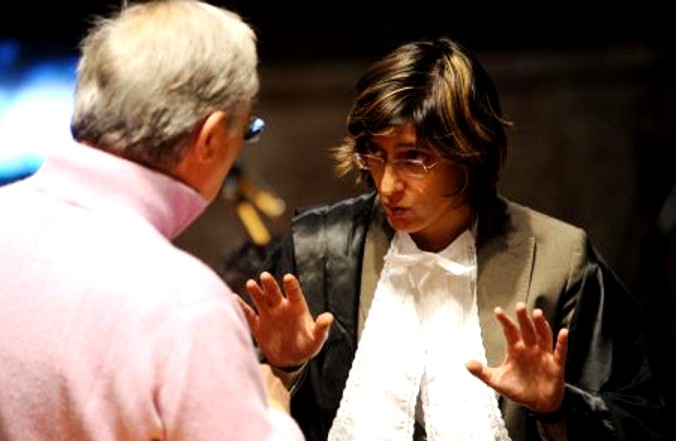
More and more and more wrong facts and libels are being turned up in Sollecito’s pathetic book, both by us here and by an irritated officialdom in Rome and Perugia.
Amanda Knox is rumored to perhaps be mentally unstable and figuratively locked in the attic in Seattle. Now Sollecito seems to have been disappeared back in Italy for his own good as well.
Sollecito’s own lawyers (who have in the past threatened to walk) and his own family have already thrown him to the wolves on Italian TV over just one highly libelous claim and there are an estimated two dozen more still to surface.
Not really a good idea to write a shrill “I’m the real victim here” book unchaperoned, when you have the smug mentality of a 12-year-old. The facts strongly against you. A very bright prosecutor. And a ghost writer whose slobbering over a laughably fictional Sollecito suggests he has a something of a boy-crush.
Raffaele Sollecito has made many stupid claims in his book, but perhaps none is so obvious and more idiotic than his claims about the “lost” emails.
What is it with this guy and the emails? He seems to think (or perhaps, thinks that the readers are stupid enough to believe) that if a computer or a hard drive is destroyed, all the emails in it are lost as well. Come on already, surely they taught him the mechanisms of email in his computer classes.
Look at his statements regarding emails. In chapter 2 (Love and Death) of his book, he describes the morning after the murder -
I’d been up several times in the night””listening to music, answering e-mail, making love””and wanted only to go back to sleep
Right, so he got up many times in the night to answer e-mails. You’d think that this would be his biggest alibi for the night of the murder, right? No, wrong. Raffaele could not prove his alibi because, in his own words -
I did not yet know that the Polizia Postale””supposedly experts in handling technology issues””had seized two of my computers along with Amanda’s and Meredith’s and somehow wrecked three of the four hard disks while trying to decipher them. The bottom line was that the damaged disks were now deemed unreadable. That left just my MacBook Pro to provide an alibi for the night of the murder.
But modern emails DON"T EVEN RESIDE on local hard drives unless one DELIBERATELY downloads them. And even if one does (and hardly anyone ever does) there rarely is reason to completely delete the original, and here there seems about zero reason to do that.
And even if the original IS deleted Facebook and email services have shown under legal pressure that they maintain complete backups going back many months. No way Sollecito’s supposed emails on the night could have been made to simply no longer exist.
Again, when he talks about Amanda and Meredith’s friendship, he says -
If either Meredith’s or Amanda’s computer had survived the police examination, there might have been photographs, emails, and other evidence to point to a more meaningful interaction
Here we go with the elusive emails again. Will someone explain the point of email to this guy? What difference would the local computers surviving or not surviving make to any emails residing on his host’s servers?
He actually has the nerve to criticize the Polizia Postale’s technical competence after making a statement to the effect that he and Amanda could not retrieve their emails as the hard disks were damaged.
Whether the hard disks were destroyed or not, whether it was the Polizia Postale’s fault or not is hardly important here. Admittedly, Amanda is not a “technical genius” (After all, she does not know how to delete messages from her sent items).
But what is stopping this resident technical genius from simply accessing his email box from some other computer or iphone, and printing out a copy from his sent items? Why doesn’t he ask even one of the happy recipients of his emails - by the way, who were they? - to forward it back to him?
Did all of them delete his mails from their in boxes and trash too? Even if we defy all logic and accept that they did, what’s stopping at least one of them from coming forward and testifying that they received a mail from him that night? Did all of them get selective amnesia at the same time too?
Similarly, if any emails that proved the “close friendship” between Amanda and Meredith existed wouldn’t they still be retrievable from Amanda’s mailbox? She could have printed a copy any time. Did she go around deleting all of Meredith’s mails the minute they arrived as well as her own replies to them, and clearing her trash box and all her host’s backups as well, just to be doubly sure they can’t be retrieved?.
Ok, let’s say the emails were deleted. What about the photographs? If there had been any photographs that would establish their “close” friendship, wouldn’t they be there on the camera or phone from which they were taken? Or wouldn’t either Meredith or Amanda have sent them to someone or posted them on their Facebook?
How did EVERYTHING vanish without a trace? If neither of them ever sent the photos to anyone or posted them online anywhere, or even kept them on file, you really have to wonder what was the point of taking them at all.
No one is claiming that Amanda and Meredith were at loggerheads all the time, they might even have gotten along initially. Meredith was not a person who judged people harshly. By all accounts, she did try her best to get along with Amanda, trying to include her in outings and defending her when she got into trouble.
It was Amanda who pulled away saying she wanted to socialize only with Italians. But the fact is that there were clashes and there were differences between them. Trying to make out that they were the best of friends by claiming the destruction of non-existent proofs is not only unbelievable but also utterly stupid.
Like our main poster Hopeful summarized it: this claimed computer genius has never in four years been able to prove he sent an email? Ridiculous.
Tuesday, October 02, 2012
Stupid Claims Made By Raffaele Sollecito #3: His False Timeline Conflicts With Other Evidence #2 DRAFT
Posted by willsavive
Establishing an Alibi (Part II)
The next morning 2 November 2007, Raffaele’s father called his landline phone at approximately 9:30am. Raffaele claims that he was “too groggy” to answer the call, after being “up several times in the night””listening to music, answering e-mail and making love.”
Knox testified that she slept through the night and awoke at 10-10:30am.
After leaving Sollecito’s place, returning home and seeing all the strange things she described (door ajar, blood droplets in bathroom, blood on the bathmat, and feces in toilet), Knox casually takes a shower and returns to Sollecito’s apartment, or so she says.
They eat breakfast and she tells Raffaele about the somewhat strange circumstances at the cottage. Raffaele then instructs her, as he writes, to call one of her roommates to discuss the situation.
Now, get ready for a head-scratcher!
In his new book, Raffaele writes that Amanda made the call to her roommate, Filomena, on the walk down to Knox’s place.
However, in his prison diary and in a letter to his father from prison, Raffaele writes that the first call to Filomena was while they were at the cottage, after Knox allegedly went around the back of the house to try to gain visual access into Meredith’s room.
But Knox testified that she made this call from Sollecito’s flat. She also wrote in her 4 November 2007 email to family and friends that the first call to Filomena was made from Sollecito’s flat. Phone records put this call at 12:08pm, coming off of sector 3, which covers Sollecito’s flat.
Both Knox and Sollecito have always maintained that they were together during this phone call.
Meanwhile, Filomena testified that during that conversation, Knox told her that she was at the cottage alone and that Knox said she was going to phone Raffaele after they hung up.
Ok, confused yet? Good liars can do that to you.
Here is how it breaks down! This is an excerpt from my book STUDY ABROAD MURDER explaining Knox’s motive for intentionally flubbing the times.
Why did Knox tell Filomena that she was at the cottage, but tell the court that she was at Sollecito’s flat during that call? The answer is simple, because the postal police arrived unexpectedly, which made Knox have to change her story.
Knox couldn’t have been at the cottage at 12:08pm, return to Sollecito’s, do all that she claimed to have done there, and then return to the cottage in time for the postal police to arrive (at 12:25pm). She had to change her story to fit her new timeline.
Raffaele has tailored his story of the call around the court-constructed time-line of events and Knox’s own version. What follows is where Sollecito’s story becomes extremely unbelievable and factually ridiculous.
It is as if he needs to do research on his own story to make it fit into what actually happened. These are not just mere mistakes, but blatant tweaks, contradicting all scientific logic, to show the guilty as innocent. Raffaele is not concerned with phone records or witness testimony; he won’t let the truth get in the way of his version.
Sollecito then claims that, while they were checking out the house, Filomena calls back, and tells Knox that Meredith is the only one unaccounted for. According to Sollecito’s timeline in his book, after the call this happens.
Then I pushed open Filomena’s door, which had been left slightly ajar, and saw that the place was trashed. Clothes and belongings were strewn everywhere. The window had a large, roundish hole, and broken glass was spread all over the floor.
So, he is actually trying to say that this was the first time that he and Knox noticed Filomena’s room in disarray?!
Let’s do some fact checking here. After their first discussion, Filomena called Knox back at 12:12pm and 12:20pm, both times she received no answer. Filomena called Knox one last time, at 12:34pm, this time Knox answered and told her to rush home.
The postal police had already arrived at the cottage and had already been greeted by the unsuspecting Knox and Sollecito.
The purpose for Knox’s original call to Filomena was to have her rush over to the cottage so that they could walk in together and discover the body. This is evidently why Knox didn’t answer either of these two calls from her. Knox wanted Filomena to discover the broken window, the locked door, etc.
However, now frantic, because police had arrived before Filomena, and in an effort to get Filomena into a frenzy and rush home, Knox tells her that her window had been broken and her room ransacked. “Come home immediately!” Knox commands.
Filomena tells Knox to call the police, and says she is on her way. Knox doesn’t make any mention that the postal police had ALREADY arrived. This is the second and last time that she speaks to Filomena until Filomena arrives at the cottage, just before 1pm.
After making a “halfhearted attempt to kick in Meredith’s door (not sure it was the right thing to do) then peering through the keyhole and seeing Meredith’s brown leather purse sitting on the unmade bed;” Sollecito then claims that Knox went across to the “terrace at the back of the house and see if we can’t reach her window,” to no avail.
In his other versions, this is where Sollecito claimed that Knox called Filomena from.
In the book, however, Sollecito claims that he proceeded to call his sister, Vanessa, at this time. Sollecito claims that he called the carabinieri after the phone call to his sister. Only minutes after the call to his sister, Sollecito claims that the postal police arrived.
But phone records show that Sollecito didn’t call his sister until 12:50pm, and then he called the emergency number (211 in Italy, comparable to 911 in the U.S.) at 12:54pm to report a burglary. This was well AFTER the postal police had arrived. Thereafter Paola and Filomena arrived at the cottage, just before 1:00p.m..
Postal police had radioed back to HQ at 12:35pm., informing them that they had arrived at the cottage.
They toured the cottage with Knox and Sollecito, looking for signs of a burglary. After Knox and Sollecito had slipped away behind Knox’s closed door to make several phone calls (including Sollecito’s calls to his sister and the carabinieri, and Knox’s call to her mother), Marco and Luca were briefed by the Postal Police and also toured the cottage briefly.
They had arrived about fifteen minutes or so before Filomena and Paola had arrived (at approx. 12:47p.m.). When Marco and Luca arrive, the postal police were already there.
Finally, the Postal Police radioed back to HQ at 1pm, informing HQ that Filomena had just arrived, as she was the reason that they were there (because the phone found was registered to her name).
Paola testified that Knox and Sollecito were coming out of Amanda’s room when she arrived at the cottage. This is clearly just after they made their phone calls, including the one to the carabinieri.
This is just a short analysis, but it reflects the myriad of inconsistencies with Sollecito’s claims. He not only contradicts the versions of others, but often times he contradicts his own versions of events.
Even though this review covers a brief period of time, it certainly reflects the most important time period for Knox and Sollecito, and may come back to haunt the couple in March 2013.
Sunday, September 30, 2012
Correcting Sollecito: A Task In Which We’d Like To Invite Everybody Here To Help DRAFT
Posted by Our Main Posters
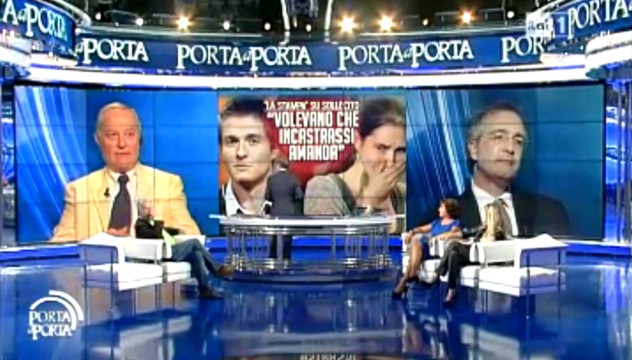
[Image above: Francesco Sollecito, left, trying to defend his loose-canon son on Italian national TV]
What was Sollecito thinking? If he was indeed thinking?
To our Italian lawyers his highly aggressive and inaccurate book seems a really misconceived attempt at an extra-legal end-run, by someone with low credibility and an over-sized ego who still stands accused of murdering Meredith.
Especially in face of an increasingly widespread grasp beyond Italy of the real facts - and of a remarkable Italian Supreme Court appeal by the prosecution which looks to be almost impossible to beat.
Main sources for the “research” by the shadow writer Andrew Gumbel seem to be Nina Burleigh and Candace Dempsey, two PR shills for the Knox family with notorious chips on their shoulders toward Italy. Andrew Gumbel seems to have anti-Italy and competency issues of his own.
None of the three are lawyers. In fact no good lawyers are publicly standing up for the two accused and repeating any of the junk law or false facts or defamatory claims in the book.
Simon & Schuster don’t seem to have insisted on any fact-checking or checking against Italian law. New charges against Sollecito have already been threatened in Italy based on the couple of pages made famous by the Porta a Porta TV program, during which Sollecito’s own father had to distance himself sharply from his son’s claims.
Italian authorities and media read here. We’d like to help them further by identifying just which “facts” are wrong in the book (in places Sollecito even contradicts his own past words) and who is unfairly depicted, which seems to be just about everybody.
Our new book corrections page is here. It can also be reached via the new link in the left column. All help is most welcome.
Thursday, September 27, 2012
Translation Of Dr Mignini’s Interview After Takedown Of Sollecito Book On Porta a Porta
Posted by Ziak.
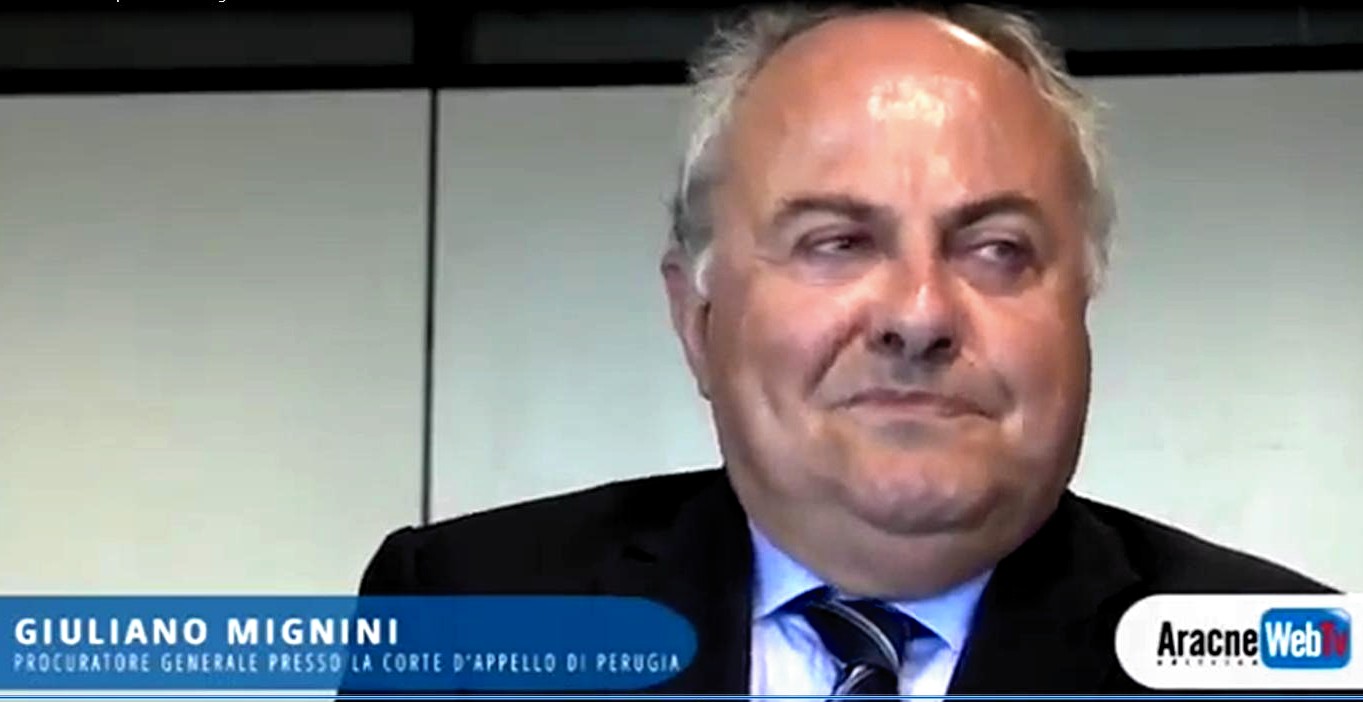
This is my translation from the original In Affaritaliani
Giuliano Mignini, the prosecutor in the Meredith case, speaks: “No bargaining with Sollecito”
Tuesday, 25 September 2012
It has been claimed that Dr Mignini had seemingly bargained with Raffaele Sollecito in order that he would accuse Amanda Knox in exchange for a lighter sentence.
But now the prosecutor in the Meredith case, Giuliano Mignini, has chosen Affaritaliani.it as the forum to break his silence: “No bargaining. It suffices to read the book attentively to understand that I have nothing to do with it. I am disconcerted by this distortion of the facts.”
And further: doubts about Amanda’s guilt? “If I had them [doubts], I would ask for absolution. I have always believed in the responsibility of both of them.”
The pressure while awaiting the sentence was enormous: “I believe that trials should take place in the halls of justice, not outside”. Both Amanda and Sollecito have written books about the murder: “These are choices that each person makes, and for which they are responsible”.
THE INTERVIEW
by Lorenzo Lamperti
In the past few days, Prosecutor Mignini, it has been written that you apparently bargained with the family of Raffaele Sollecito, offering a lighter sentence in return for testimony against Amanda Knox.
“I must say at this point that I am disconcerted [dismayed] by this distortion of the facts. It suffices to read what Sollecito has written in his book in order to understand that I have absolutely nothing to do with it.
Furthermore, Raffaele’s father has denied the existence of any bargaining.
However, I continue to see newspapers which publish these things. Let’s forget about the American newspapers, over which it would be best to draw a pitying veil, however it surprises me that even here in Italy facts are talked about which have never been checked.
Sollecito’s father denied this live on television, and yet there weren’t even any starting points to support something [claims] of this sort.
Thus there was an exploitation is Sollecito’s account?
“That seems clear to me. And yet the event of the Kercher process was preceded by that of the Monster of Florence [the Cassation Court will deliver its verdict on 22 November, editor’s note]. That was what started everything: I never said anything, but I’m fed up, sick and tired at this point. There has been too much superficiality on the Meredith story.”
Raffaele Sollecito speaks of a lawyer who apparently bargained/negotiated with his family…
“These are merely conjectures on conjectures. And yet, I don’t understand how Sollecito’s account can have been interpreted as referring to me. Looking carefully at things, it could almost be said that it is me who is the person offended by a boast.”
Are you considering legal action?
“I have 90 days. I will consider it. Certainly, I must take note of Dr Sollecito’s denial.
What his son wrote, or at least, what the newspapers report, has not been libelous with regard to me. The problem lies in the interpretation of his text that has been made. It would suffice to read [the book] correctly in order to understand that we are talking of simple impressions, not of facts.
The only concrete references are made to a few persons who are not me.”
Therefore you rule out the existence of a secret bargain?
“Indeed! in the most absolute manner possible. What for, why after the conviction and the appeal request for life sentencing, would I seemingly started to negotiate?! What would I negotiate about?
Thus you have never had any doubts about Amanda’s guilt?
These doubts don’t exist. If I had doubts, I would have asked for absolution. I have always believed in the responsibility of both these two.”
The Cassation appeal is also based on Amanda’s conviction for calunnia.
“This is one of the fundamental aspects of the appeal [our appeal against Hellman] which is moreover based on numerous other reasons. The appeal has been made very well. We’ll see what the Cassation decides on 25th March next year.”
The fact remains that a striking situation has been created, in which Rudy Guede has been convicted for contributing to a murder, but according to the courts there are no [other] contributors, or at any rate, Amanda and Raffaele are not contributors…
“Yes, yes. Indeed. Rudy Guede is convicted as having participated. Sollecito and Knox were acquitted. Furthermore, Rudy Guede, as we have seen, was not even convicted of having carried out the simulated break-in…
These are problems that arise with the fast-track trial system, when one part of the case is separated from the other part. This case, on the contrary, is a unitary whole [a single case].
There was very considerable pressure brought to bear on the trial process. Do you believe that it might in any way have had an influence on the sentence?
“I don’t know if it influenced it. I know that the Court had that idea, that conviction, which I don’t share. Certainly the pressure brought to bear was extreme. I believe that trials should take place in the halls of justice, not outside.”
You rashly spoke of an “almost predicted” sentence.
“Those who followed the appeal process can make their own assessments. According to us, the first instance sentence was correct and complete. We’ll see what Cassation decides, but, over and above the process I cannot accept certain insinuations.
I was exclusively made the butt of attacks. I remain dismayed, for example, when reference is still made to comments I denied having made years ago, in which I reportedly linked Meredith’s murder to satanic rites. This is something I never said, but which is still continuously written.”
Is it a case of errors, superficiality, or of something more?
It is no longer possible to talk of errors, because it has been years since I disclaimed those comments. At this point, the thing confounds me.”
Many people, faced with Sollecito’s book and the one by Amanda which will come out shortly, turn up their noses and consider it wrong to profit from a tragedy such as the murder of Meredith. What do you think?
“These are choices that each person makes, and for which they are responsible. I will limit myself to saying that the process is still under way, and we must await Cassation.”
Sollecito’s Book Honor Bound Hits Italy And Already Scathing Reactions And Legal Trouble
Posted by Peter Quennell
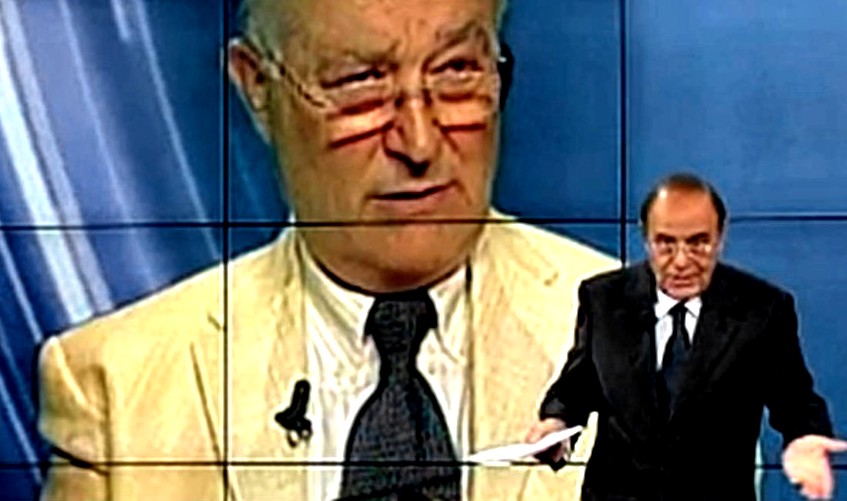
[Above: Sollecito’s father Francesco on Italian national TV being made to admit the book lied]
The Sollecito/Gumbel book is an “own goal”
In Italy the extremely inaccurate and hyper-aggressive book has already set themselves up for two kinds of trouble
The Gumbel and Sollecito book was released in English on 18 September 2012 and within ten days all of Italy knew that the book was a crock.
Sollecito’s own father and own lawyers Bongiorno and Maori have already been forced to admit the book contains serious lies.
Already the prosecution has indicated that they are weighing whether there might be new charges lodged against Sollecito.
Analysis Of 3 Claims Of Criminal Conduct
We focus on three claims by Sollecito and Gumbel of criminal behavior which have already been widely repudiated by the Italian press.
1. A deal was sought by prosecution to frame Knox
Sollecito’s own father Francesco was made to concede by the host and all other guests on the popular Porta a Porta TV show last week that Sollecito lied in claiming that the prosecution had sought a deal under which Sollecito would frame Amanda.
Such a deal would be illegal so Sollecito was falsely accusing prosecutors of a very serious crime. Francesco Sollecito backed down even more in some interviews later. One of Sollecito’s own lawyers, Luca Maori, immediately denied in obvious frustration that the offer of any deal either way ever happened, and Giulia Bongiorno soon publicly agreed. .
2. A long brutal interrogation on 5-6 November 2007
Sollecito has suddenly claimed in the book, nearly five years after he said it happened, in face of vast evidence including his own writings to the contrary, that police interrogated him over 10 hours, and abused and threatened him.
But he was demonstrably not ever interrogated over 10 hours, and he folded fast when they showed him his phone records, which contradicted his earlier alibis, and so he promptly laid the blame on Amanda.
The English translations of the lengthy court transcripts of those many who were present at the central police station on the night all coincide, and damn the version cooked up by Sollecito and Gumbel..
3. Deliberately wrong reasoning in the Galati appeal
All this trouble flows from half a dozen pages of Sollecito’s book made public in Italy! Here now are several more pages not yet known about there (we will have many more) which our poster ZiaK has translated into Italian to help everybody to read. Sollecito ridicules both Dr Galati and his appeal. Let’s see:
- Dr Galati is recognised as one of the most brilliant lawyers in Italy, and he is a former Deputy Chief Prosecutor at the Supreme Court, specially assigned to Perugia because cases involving the central government are handled there when they are too hot to handle in Rome.
- Solllecito is of course a 28-year old student with a cocaine record and a long history of parental supervision who has never held a job in his life. He failed the entrance exam in virtual reality for the University of Verona but still has delusions of a career in computer games.
And surely Gumbel would never have got the job if Bongiorno and Maori had the opportunity to size up how wildly incompetent about the law and the case and and twisted in his mind about Italy he seems to be.
These ill-advised pages below show Sollecito’s and Gumbel’s profound ignorance of Italian jurisprudence, a total incomprehension of the wide scope of the appeal, and their contempt toward the advice from his lawyers.
Passages highlighted are wrong on the hard facts as shown in part 2 below.
1. What The Sollecito/Gumbel book claims
Judge Hellmann’s sentencing report was magnificent: 143 pages of close argument that knocked down every piece of evidence against us and sided with our experts on just about every technical issue. It lambasted both the prosecution and the lower court for relying on conjecture and subjective notions of probability instead of solid evidence. And it launched a particularly harsh attack on Mignini for casting aspersions on the very concept of proof beyond a reasonable doubt.
Mignini had dismissed it in one of his court presentations as a self-defining piece of linguistic trickery. Hellmann pointed out that reasonable doubt was now””belatedly””part of the Italian criminal code. A case built on probability alone, he said, was not sufficient and must necessarily lead to the acquittal of the defendant or defendants.
The prosecution’s rebuttal of the sentencing report, filed a couple of months later, was little short of astonishing.
It accused Hellmann of indulging in circular arguments, the old rhetorical fallacy known to the ancients as petitio principii””essentially, starting with the desired conclusion and working backward. The criticism applied much more accurately to what the prosecution and Judge Massei had done themselves; everything, even the absence of evidence, had been a pretext for them to argue for our guilt. But the author of the prosecution document, Giovanni Galati, chose not to dwell on such ironies. Instead, he attacked Hellmann””I wish I were joking about this””for resorting to deductive reasoning. Making yet more allusions to grand rhetorical principles, Galati said he had a problem with the appeals court taking the available evidence and seeking to make each piece follow on logically from the last. I take it he is not a fan of Sherlock Holmes.
Galati seemed incensed that Hellmann had found the “superwitnesses” unreliable. He argued that Hellmann’s problem with Antonio Curatolo, the heroin addict in Piazza Grimana, was not his failure to be consistent about the details of when and where he had supposedly seen us but rather Hellmann’s own “unwarranted prejudice against the witness’s lifestyle.” Galati even dared to embrace Curatolo’s argument that heroin is not a hallucinogen to insist he must have been telling the truth.
These arguments, to me, made a mockery of civilized discourse. I don’t honestly know how else to characterize them.
From my experience, I also know they are the bread and butter of the Italian legal system, the peculiar language in which arguments and counterarguments are formed every day. Not only do innocents go to prison with shocking regularity, while guilty people, equally often, win reprieve or acquittal; magistrates and judges who make the most howling errors rarely pay for their mistakes.
See Part 3 below for an Italian translation of the above, kindly supplied by main poster ZiaK.
2. Correctly explaining Cassation’s reasoning
Read all the posts here. Also read all the posts linked to here.
Italy’s excellent justice system is in fact exceptionally pro defendant, and prosecutors have to jump through more hoops than any other system in the world. Major errors and framings of innocent parties never make it through to a final guilty verdict.
Correctly understood in light of that system, there was nothing magnificent about the Hellman-Zanetti outcome. The Hellmann court is KNOWN to have been hijacked.
And these posts by Cardiol and James Raper show the report was written by two biased and wrongly qualified judges way out of their depth on both the evidence and the law.
Here is main poster Machiavelli’s explanation of what Sollecito.doesn’t get. The required logic Sollecito is ridiculing is intrinsic to Italian jursprudence (and US and UK jurisprudence) and is REQUIRED by the Supreme Court.
In plain English, Dr Galati is saying that Hellmann-Zanetti ignored that requirement.
Instead, they illegally went cherrypicking, with an extreme pro-defendant bias up-front. Bold text here is to emphasize that.
2. The failure to apply the inferential-inductive method to assess circumstantial evidence. This is a key point based on jurisprudence and is in fact a devastating general argument against Hellmann-Zanetti:
The appeal to Cassation’s jurisprudence on the circumstantial case originates from the fact that the Assize Appeal Court did not deploy a unified appreciation of the circumstantial evidence and did not examine the various circumstantial items in a global and unified way.
With its judgment it has, instead, fragmented the circumstantial evidence; it has weighed each item in isolation with an erroneous logico-judicial method of proceeding, with the aim of criticizing the individual qualitative status of each of them ..
Dr Galati accuses the appeal court of focusing on the quality of some pieces of circumstantial evidence, instead of their correlation to each other as the Supreme Court always requires. .The appeal judges, in actual fact, deny that the probative reasoning and the decisive and cognitive proceeding of the court is to be found in the circumstantial evidence paradigm of the hypothetico-probabilistic kind, in which the maxims of experience, statistical probability and logical probability have a significant weight.
The court must reach a decision by means of the “inductive-inferential” method: it proceeds, by inference, from individual and certain items of data, through a series of progressive causalities, to further and fuller information, so arriving at a unification of them in the context of [13] the reconstructed hypothesis of the fact.
This means that the data, informed and justified by the conclusions, are not contained in their entirety in the premises of the reasoning, as would have happened if the reasoning were of the deductive type “¦ (..) A single element, therefore, concerning a segment of the facts, has a meaning that is not necessarily unambiguous.
Dr Galati cites and explains further:
The Perugia Court of Appeal has opted, instead, precisely for the parceled-out evaluation of individual probative elements, as if each [14] one of them must have an absolutely unambiguous meaning, and as if the reasoning to be followed were of the deductive type.
This error emerges from the text of the judgment itself, but the gravity of the error committed by the Court in its decision derives from the fact that even the individual elements had been acquired by the cognitive-decisioning process in a totally partial manner, isolating the sole aspect that allowed the recognizing of doubts and uncertainties in the element itself..
So Galati-Costagliola concludes ““ and this by now is obvious ““ that the Hellmann-Zanetti court followed a “deductive only” paradigm on pieces in isolation, instead of the “inferential-inductive” paradigm prescribed by Supreme Court requirements (1995).
Moreover, Hellmann-Zanetti applied a deductive paradigm of assessment only to some cherry picked aspects of the single isolated pieces of evidence, overlooking other qualities of the single piece (an example ““ my own ““ is the possible “contamination” of the bra clasp found on the floor in the murder room.) Ordering an assessment of the quality of any element as if it was a proof in isolation from the rest of the evidence is itself unlawful.
But Hellmann”“Zanetti also picked out of the evidence one aspect alone, for example it points to the theoretical possibility of contamination by touching from gloves, but does not consider the negative check results from the possible contamination sources. The interpretation of X-DNA from the bra-clasp by Vecchiotti in the conclusion is worded as if to ignore the results on the Y-haplotype, and so on.
So even single aspects/qualities of isolated items are further isolated from other aspects by Hellmann-Zanetti, and are assessed without looking for a relationship to the context. This is a core violation of the basics of jurisprudence in cases based on circumstantial evidence.
3. Italian Version of the passage on the Cassation appeal from Sollecito’s book
This translation is kindly provided by main poster ZiaK.
Il rapporto di motivazioni del giudice Hellmann fu magnifico: 143 pagine di ragionamenti serrati che demolirono ogni singolo pezzo di prova contro di noi, e che con riferimento a quasi ogni questione tecnica presero le parti dei nostri esperti. Il rapporto strigliò sia la pubblica accusa, sia la corte di prima istanza per il loro affidamento ai congetture e ai nozioni soggettivi di probabilità invece di dipendere su prove solide. Perdipiù, il rapporto sferrò un attaco particolarmente severo su Mignini per aver denigrato il concetto stesso di prova oltre ogni ragionevole dubbio. Mignini aveva già scartato questo concetto come un inganno linguistico auto-determinante nel corso di uno delle suoi presentazioni alla corte. Hellmann fece notare che il dubbio ragionevole fa ormai - tardivamente - parte del codice penale italiano. Una causa stabilita unicament su probabilità , disse Hellmann, non é sufficiente e deve necessariamente condurre all’assoluzione del imputato o degli imputati.
La confutazione del rapporto della parte dell’accusa, presentato in appello un paio di mese dopo, fu quasi una cosa sbalorditiva.
Accusò Hellmann di abbandonarsi a argomentazioni viziosi, in quella vecchia falsità retorica conosciuta dagli antichi come petitio principii - cioè,sostanzialmente, partire dalla conclusione desiderata per poi andare a ritroso. Questa critica potrebbe essere applicata con molto più precisione a ciò che fecero l’accusa e il giudice Massei stessi: tutto - compresa anche la mancanza di prove - gli é servito di pretesto per dare appiglio agli loro argumenti sostenendo la nostra colpevolezza. Ma l’autore di quel rapporto della pubblica accusa, Giovanni Galati, scelse di non soffermarsi su queste ironie. Al contrario, preferii attacare Hellmann - io desideri davvero fossi solo scherzando su questo punto - per il suo aver ricorso al ragionamento deduttivo. Perdipiù, facendo ancora altre allusioni a grandi principi retorici, Galati si dichiarò insoddisfatto del fatto che la Corte d’appello avesse preso prove disponibili e avesse cercato di far seguire in modo logico un pezzo dopo l’altro. Devo supporre che Galati non sia un tifoso di Sherlock Holmes.
Galati sembrò furibondo che Hellmann avesse trovato inaffidabili gli “supertestimoni”. Sostenne che la difficoltà che Hellman terrò a proposito di Antonio Curatolo, il tossicomane della Piazza Grimana, non fu la sua incapacità di ricordarsi con coerenza i dettagli su quando e dove fossimo presumibilmente visti, ma piuttosto il “pregiudizio ingiustificato contro il modo di vivere del testimone” mantenuto del stesso Hellmann. Galati osò persino cogliere l’argomento di Curatolo, secondo il quale l’eroina non é un allucinogeno, per sostenere che Curatolo avesse dovuto dire la verità .
Tali argomentazioni, al mio parere, svuotino il discorso progredìto di tutte le sue valori. In onestà , non saprei descriverli in modo diverso. Nella mia esperienza, so anche che sono il fondamento del sistema giuridico italiano, e della la lingua particolare nella quale gli argumenti e controargumentazioni sono formulati ogni giorno. Non solo gli innocenti vengono incarcerati con preoccupante frequenza, mentre le persone colpevoli con altrettanto frequenza ottengono sospensione o assoluzione, ma anche i magistrati ed i giudici che fanno gli più strepitosi errori pagano raramente per i loro sbagli.
.
[Below: Sollecito’s lead lawyer Bongiorno. Still in shock? She has made no statement yet on his book]
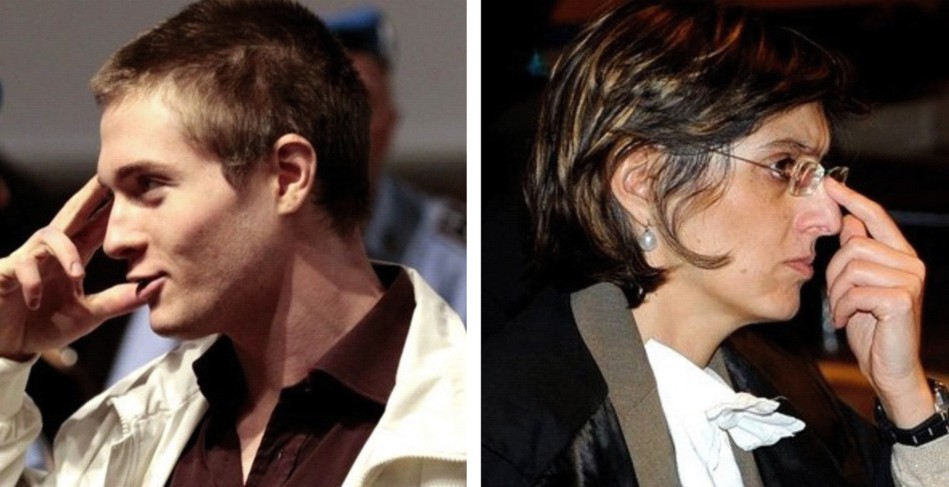
Wednesday, September 26, 2012
Kane Hall Book Promotion: Interviewer And Sollecito Panderer Dennis Bounds Drops The Ball Terribly
Posted by Media Watcher
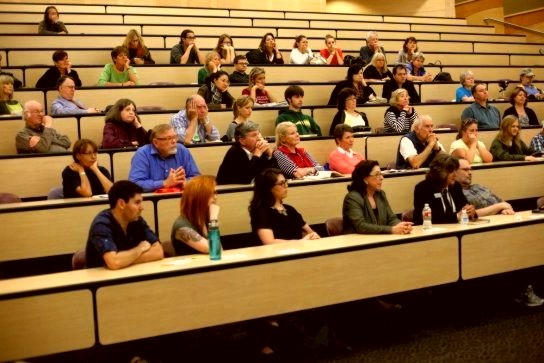
[Above: Amanda Knox’s mother and sister are to the right in the back row in white and red sweaters]
Sales statistics show that Sollecito’s book is selling terribly and light-years from recouping costs.
Tonight’s public interview showed one good reason why. A small mostly elderly entirely white crowd in Kane Hall heard Sollecito being allowed to blame it solely on the black guy. Not even his own lawyers did that. But there was no argument from the interviewer, no tension, no excitement, no sense of discovery or truth.
And the feeble questions moved on.
Dennis Bounds, anchor for KING-5 television news in Seattle, certainly demonstrated why he’s no journalist. After tossing softball after softball at Sollecito during an “interview” at UW’s Kane Hall and then teasing Sollecito that he should come to the UW as an exchange student, Bounds declared “You’re out of jail and you’re not guilty - which is the important thing.”
Untrue. Sollecito still stands accused of Meredith’s murder until the Supreme Court signs off on the case. The pandering Dennis Bounds was eagerly first in line to get a book signed by the accused. See the image at bottom.
The problem with most of the US media is that they’ve never taken the time to review the case, including the original Massei sentencing report (which gives very thoughtful, not sensational, overview of the evidence and how it ties together), what was reviewed during the appeal and what specific elements should have been under review, and what that means for the prosecutor’s appeal that’s now been submitted to Italy’s Supreme Court.
Hard questions a real journalist could have asked
These are examples of what Dennis Bounds could have asked Sollecito in direct follow-up to answers that Sollecito gave tonight, instead of moving on to the next softball.
Sollecito: After ten hours of questioning in a very rude, aggressive way”¦(one of the detectives said) “If you stand up now, I will leave you in a pool of blood.”
Journalist: Are you asserting that one of the detectives threatened you? Did you relay this to your family and ultimately to your attorneys?
Sollecito: No one ever asked me to be on the witness stand. No one ever asked me anything. I was a shadow.
Journalist: Who prevented you from testifying? Did you want to testify? Did you ask your attorneys to let you testify? Given that you were willing to testify, what can you say here tonight about why you gave so many versions of what you were doing the night the murder took place.
Sollecito: For any kind of detail, I’m here; you can ask me.
Journalist: Why did you tell detectives that there was a burglary, but nothing was taken before the room in question was even checked out? And given that it wasn’t your room, how did you know that nothing was taken?
Journalist: You and Amanda claimed that you needed to get a mop from Amanda’s flat to wipe up under a leaky sink. Why would you wait hours to go get a mop unstead of just sopping up the water with towels from your own flat?
Sollecito: Most of the people who are “guilters” follow the media and don’t know anything about the case.
Journalist: If that’s the case, why are they asking questions about how Meredith’s fresh blood got mixed with Amanda’s DNA in multiple places in the bathroom, and why are they so focused on phone records that showed that what you told detectives originally was untrue.
Sollecito: (About Rudy Guede) - He is a burglar who did similar burglaries”¦..he’s most probably implicated; he’s most probably the only one.
Journalist: If Guede was the only person there that night, where did the other footprints come from, how did Amanda’s DNA get mixed with Meredith’s blood, and who do you think staged the break-in, after making sure Meredith’s room was locked?
Journalist: And by the way, can you explain why Amanda Knox called her mother in the middle of the night, Seattle time, given that to that point, she should not have known anything about the dark events that had taken place in the flat? Were you with her when she made that call?
Tuesday, September 25, 2012
Will Sollecito Drop Amanda Knox In It Further In A Public Seattle Interview At 7:00 PM Tonight?
Posted by Peter Quennell
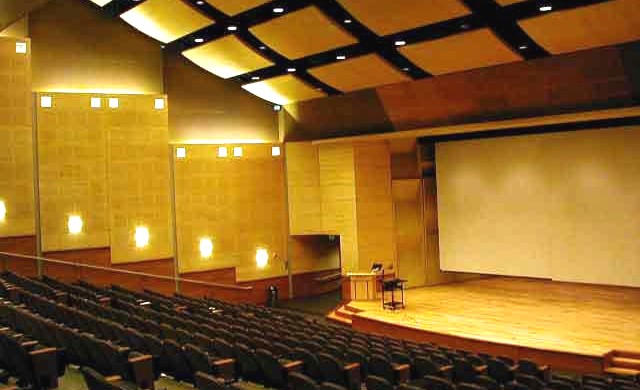
This is Kane Hall on the University of Washington campus where at 7:00 tonight Sollecito is set to be interviewed.
What was described in this excellent series by an Italian lawyer on four of the Porta a Porta shows continues to be the case. One perp slyly pushing another toward the fire, in an attempt to protect his own sorry ass.
On two levels the woolly-brained component of the Seattle media and the woolly-brained Knox-Mellas camp seem to have only the dimmest comprehension of the slow-motion train-wreck Sollecito has managed to create.
(1) Sollecito may continue to claim that he “saved” Amanda by standing by her when others urged not to, but as future posts here will show, he provably didnt, and in his book in a number of places he includes very incriminatory points about her.
(2) Provable lies in Sollecito’s book have already stirred up a hornet’s nest in Italy and his own father and his lawyers have backed off - right when RS and AK face one of the toughest appeals our Italian lawyers have ever seen.
Can Sollecito be expected to make things worse both for Amanda and for himself tonight? It may not be obvious to much of the audience, but our own bet is: for sure. Must-read posts in advance here and here and here.
And a must-read book. That narcissistic killer flaunted the system - and is now doing 33 years.

